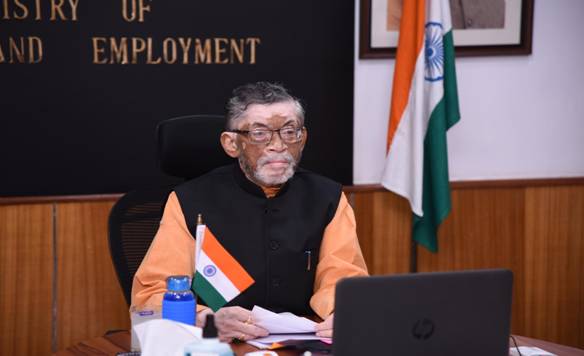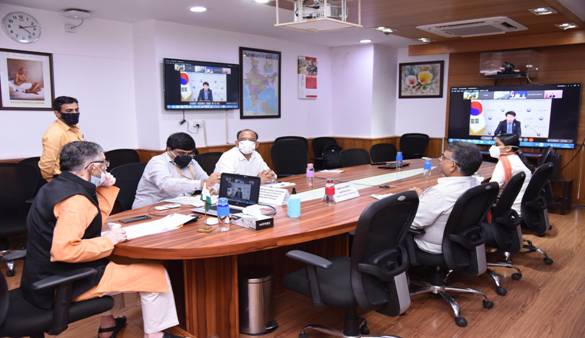Santosh Gangwar delivers Ministerial Address on Declaration and EWG Priorities at G20 Labour and Employment Ministers’ Meeting
Union Minister for Labour and Employment Shri Santosh Gangwar has said that India is making collective efforts to reduce gender gaps in labour force participation. The country is ensuring education, training, skilling, entrepreneurship development and equal pay for equal work. Delivering Ministerial Address on Declaration and Employment Working Group Priorities at G20 Labour and Employment Ministers’ Meeting here today, Shri Gangwar said, the new Code on Wages, 2019 shall reduce gender-based discrimination in wages, recruitment and conditions of employment. Women are entitled for all types of work in all establishments. Employers have to ensure their safety and provisions for working hours. Women can now work even during night hours.

Shri Gangwar said, the duration of paid maternity leave has been increased from 12 weeks to 26 weeks. Pradhan Mantri Mudra Yojana provides financial support to women entrepreneurs to start small enterprises. Collateral free loans worth Rupees 9 thousand billion have been disbursed under this scheme. There have been around 70% accounts of women in this Scheme.
The Minister added that the new Code on Social Security may now include even self-employed and all other classes of work force into the folds of social security coverage. A voluntary and contributory pension scheme introduced in 2019 for the unorganised sector workers provides for minimum assured pension after the age of 60 years.
While supporting the adoption of the Joint Ministerial Declaration, the Minister emphasised that such an initiative by the member countries shall be very helpful for the overall development and capacity building of entire young generation, which is rapidly evolving and has now become more challenging due to the pandemic.

The Employment Working Group deliberated upon key issues, including women employment, social security and remote working. The subject for the meeting being Fostering an inclusive, sustainable, and resilient recovery of labour markets and societies.
In 2014, G20 Leaders pledged in Brisbane to reduce the gap in labour force participation rates between men and women by 25% by 2025, with the aim of bringing 100 million women into the labour market, increasing global and inclusive growth, and reducing poverty and inequality. In recent years, almost all G20 countries made progress in terms of equal opportunities, participation of women in the labour market and reduction of the gender pay gap. The process of reducing gender inequalities has slowed down due to the impact of the COVID-19 pandemic on the global economy. The measures implemented by G20 countries helped to mitigate the employment and social impact of the COVID-19 crisis. Yet, evidence from many countries shows a disproportionate impact on women. Acknowledging the risk of increasing gender inequalities in labour markets and societies, G20 Leaders at the Riyadh Summit called for a roadmap to achieve the Brisbane goal along with improving the quality of women’s employment.
In response to this call, the G20 Roadmap Towards and Beyond the Brisbane Target has been developed for achieving equal opportunities and outcomes for women and men in our labour markets as well as societies in general. This Roadmap builds upon the G20 Policy Priorities for Boosting Female Participation, Quality of Employment and Gender Equity (Australia, 2014) and the G20 Policy Recommendations to Reduce Gender Gaps in Labour Force Participation and Pay by Improving Women’s Job Quality (Germany, 2017).
Many factors continue to hinder the participation of women in the labour market and the improvement of the quality of their employment. Overcoming these barriers is key to achieving not only the Brisbane target and previous commitments of member States, but also aiming at full gender equality in the labour market and in societies. To achieve this goal, it should be ensured that policy measures are informed, by behavioural insights, based on data and evidence and adapted in accordance with national circumstances. Against this background, the G20 Roadmap Towards and Beyond the Brisbane Target has been set as: Increasing the quantity and quality of women’s employment; Ensuring equal opportunities and achieving better outcomes in the labour market; Promoting a more even distribution of women and men across sectors and occupations; Tackling the gender pay gap; Promoting a more balanced distribution of paid and unpaid work between women and men; and Addressing discrimination and gender stereotypes in the labour market.
